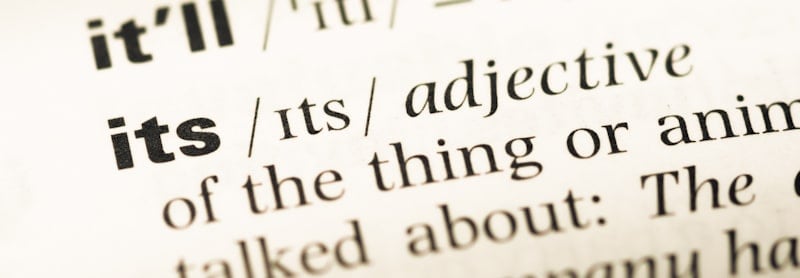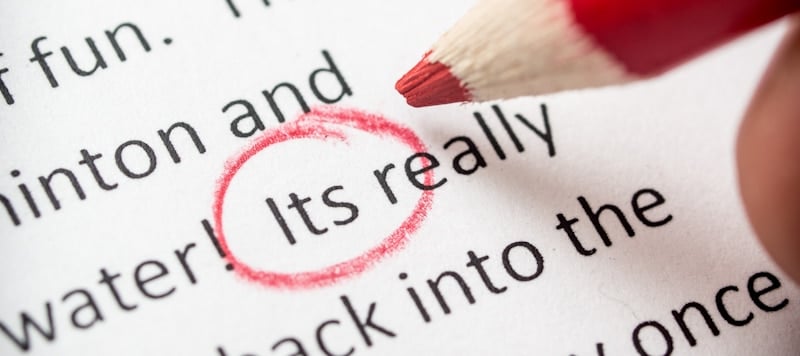One of the most important things, when you are about to write, is to make sure you follow the rules. Here you will find easily and straightforwardly what you need to capitalize in a title, and in this particular case, to find out if the word “its” must be capitalized.
In a title, every word must be capitalized, there are some exceptions, but the word “its” is not one of them; it must always be capitalized in a title. Let’s find out the reasons why we should always do it.
It could be overwhelming when grammar needs to be adequately done; we don’t want to make any mistakes or to be exposed by our grammar ignorance.
Rules for Capitalizing the Term “Its”
Imagine that you are back to being a fifth-grade student and that one day your teacher asks you to go in front and identify all the parts of a sentence. It could be so embarrassing, your mind goes blank, and you cannot remember a thing! It feels so challenging and hard not to decompose a sentence, not being able to understand its logic.
So you made it through fifth grade, but you will never forget how your teacher could not go over the subject and repeat it for you, and you are pretty sure you were not the only one who could not understand.
Luckily we are at a different time, and we can rediscover many things. Among them, there is the ability to go over and study basic grammar.
Let’s remember some basic grammar to understand a bit more about what the word “its” means.
“Its” Meaning Of The Word
The word “its” must always be followed by a noun; that’s what makes it a dependent possessive pronoun.
For example:
- The Committee Has Its Hypothesis Backed Up.
- My Story of Raising a Lion and Its Paws.
- The Family’s Company and Its Head.
In a title, every word must be capitalized except:
. Articles (a, an) unless they are the first words in the title. For example:
- A walk through the Clouds.
- A Day to Remember.
- Snakes on a Plane.
- Along Came a Spider.
- Rebel Without a Cause.
- A Wonderful Day at The Park.
- My Daughter Has an Imaginary Friend.
- How to Be Successful Being an Entrepreneur.
- How to Cook a Meal in Thirty Minutes?
- A Guide for Baking the Best Chocolate Cookies.
Coordinating conjunctions (and, or). Here are some examples:
- Thelma and Louise.
- Dazed and Confused.
- The Sound and The Fury.
- How to Win Friends and Influence People.
- Harry Potter and the Sorcerer’s Stone.
- Wake Me Up for Breakfast.
- Don’t You Worry Just yet.
- My Journey as a Mom.
- Yes, I am so into You.
- How to Understand the Purpose of Democracy, but Without Any Judgment.
Prepositions such as in, for, up. An exception to the rule is if they are the first word of a title.
Let’s see some examples:
- Midnight in the Garden of Good and Evil.
- A Wrinkle in Time.
- The Catcher in the Rye.
- The Man Who Mistook His Wife for a Hat and Other Clinical Tales.
- The Importance of Being Earnest.
- Up You Go!
- Depression as a Partner and How to Live with It.
- I am so into Your Brain.
- As Many Years as You Can.
- In My Home Town.
Let’s go over some details about the relationship between pronouns and nouns, which in the long run will give you a better structure of the grammar in general and are easy to remember.
- A noun means a thing; it can be the subject or the object of a sentence. A pronoun is a less precise word than a noun, and it helps avoid repetition.
- A personal pronoun is used to indicate or refer to words that can´t be properly understood if there is no additional contextual information.
- A third person pronoun refers to things or people who are not the speaker or the person to be intended for.
- A dependent possessive is a genitive noun that acts as a determiner within a noun phrase, including a nominal phrase. For example:
- The bird is my sister´s bird.
- The car is my car.
- If a pronoun is used, it has to be a dependent possessive pronoun.
- The basic possessive determiners are my, your, his, her, its, our, their and, whose.
Examples of the use of possessive determiners:
- The PentHouse number 1620 is my property.
- I have your red cap in my car.
- The pink laptop belongs to her.
- They walk around their neighborhood every evening.
- His wife called and said he was sick.
- Her shoes are very pretty and look very comfortable.
- It might be our time to go over the point and make a proper decision.
- Their pets are very smart and funny.
- He is very jealous of his work, never shares any of his thoughts before it’s published.
- My obsession with the beach goes beyond any understanding.
As I mentioned earlier in this article, I will share some more basic rules and exceptions with you according to the capitalization in the titles.
Do Always capitalize:
The first and last word.
(Tears of the Sun)
The nouns and pronouns.
(Austin Powers: International Man of Mystery)
The verbs and helping verbs.
(Bang the Drum Slowly)
Adverbs and adjectives.
(The Good, the Bad and the Ugly)
About Capitalization In General
Capitalizing is used to show to the person that is reading your piece that some words are important, such as proper names and official titles.

Proper Noun Capitalization Examples,
- Names of people and/or pets. Jose, Ana. Zeus, Lucky.
- Locations. Africa, Dominican Republic, Caracas.
- Months and days of the week. September, November. Sunday, Wednesday
- Holidays. Christmas, Easter.
- Religions. Catholicism, Christianism
- Cities and states. Miami, Fort Lauderdale. Virginia, New York.
- Languages. Italian, Spanish, English.
- Brand names. Gatorade, Mountain Dew, Barilla.
After a colon, it is not necessary to capitalize. What are the exceptions? When the word following the colon is a proper noun and If the words following a colon form a complete sentence. For example, Curry is used in Indians and Jamaican dishes: It greatly enhances food flavor.
There are at least three (3) different styles guides for writing; these are guides you should check out if you want to make writing a profession. And after understanding each style and writing every day about anything, you will develop and own your proper style.
Proper grammar can be very complex. It is guaranteed that you will eventually remember the most important rules of grammar and naturally work with them; once you start writing and reading tons of articles, books, newspapers, you name it, and it will flow like riding a bike. At first, you will be overwhelmed with so many rules and details, at least I did (remember the fifth-grade story)
Conclusion
To summarize the most relevant information that concerns us at this time, remember you should always capitalize:
- The first word. (Example: Developing a Cure for Anxiety. All the Facts)
- All nouns. (My Story Behind Curtains)
- All verbs, even short ones, like it. (It Is Show Time!)
- All adjectives. (The Beautiful State of California)
- All proper nouns. (Your Future Is up to You)
And for the word “Its,” we now know that it is a possessive determiner pronoun, and it can be used in our titles capitalized without having doubts about it.
Shawn Manaher is the founder and CEO of The Content Authority. He’s one part content manager, one part writing ninja organizer, and two parts leader of top content creators. You don’t even want to know what he calls pancakes.


